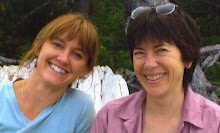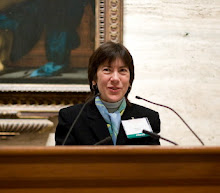On December 12th, I posted "Chance of Snow, Then Snow" -- a found poem composed entirely of forecast phrases from NOAA Weather Radio and inspired, one day during a blizzard, by the rhythmic reporting of snow variations on our local Weather Radio station WXK73. Thinking they might like to see the poem, I e-mailed the link to the nice folks at the National Weather Service office in Marquette, who manage that station. They totally floored me by sending back an audio file of their radio computer voice reading my poem!
So now you can listen to the poem being read by the voice that inspired the poem. Click on the arrow below to play the audio. Thanks to the National Weather Service office in Marquette for this recording, and for the great job they do providing us with weather information!
Saturday, December 19, 2009
Saturday, December 12, 2009
Chance of Snow, Then Snow
Found poetry, says Wikipedia, is "created by taking words, phrases, and sometimes whole passages from other sources and reframing them as poetry." This is exactly what I did one day a few winters ago as I sat housebound by a blizzard, listening on and off to NOAA weather radio and hoping for a break in the storm.
The more I listened to the winter voice of the National Weather Service, broadcasting from Marquette, the more I settled into its distinctive rhythm, and then -- yes -- its poetry. I heard not only information, but also nuance and progression: the arc of a story in what appeared out my window as relentless, monotonous white.
That day, I jotted down my favorite forecast phrases and tweaked them into this verse. I offer it here now in light of the Upper Peninsula weather of the last few days, as well as the weather to come. Happy winter!
Chance of Snow, Then Snow*
Expect cooler temperatures,
Single digits.
Chance of snow,
Snow flurries.
Light snow,
Snow likely.
Scattered snow,
Snow showers.
Blowing snow,
Snow falling.
Heavy snow,
Snow accumulation.
Snow and drifting snow --
Snow and fog --
Snow and ice --
Snow and sleet --
Snow and freezing spray.
Snow will begin to diminish!
Breezy.
-Katie Alvord
* Composed entirely of forecast phrases from NOAA weather radio station WXK73, originating from the National Weather Service office in Marquette
© 2006, 2009 by Katharine T. Alvord
The more I listened to the winter voice of the National Weather Service, broadcasting from Marquette, the more I settled into its distinctive rhythm, and then -- yes -- its poetry. I heard not only information, but also nuance and progression: the arc of a story in what appeared out my window as relentless, monotonous white.
That day, I jotted down my favorite forecast phrases and tweaked them into this verse. I offer it here now in light of the Upper Peninsula weather of the last few days, as well as the weather to come. Happy winter!
Chance of Snow, Then Snow*
Expect cooler temperatures,
Single digits.
Chance of snow,
Snow flurries.
Light snow,
Snow likely.
Scattered snow,
Snow showers.
Blowing snow,
Snow falling.
Heavy snow,
Snow accumulation.
Snow and drifting snow --
Snow and fog --
Snow and ice --
Snow and sleet --
Snow and freezing spray.
Snow will begin to diminish!
Breezy.
-Katie Alvord
* Composed entirely of forecast phrases from NOAA weather radio station WXK73, originating from the National Weather Service office in Marquette
© 2006, 2009 by Katharine T. Alvord
Sunday, November 22, 2009
More Eco-fiction
Our shelf of eco-fiction is expanding. Here is a new list that includes suggestions from a few sources, including those who commented on the previous post:
Black Sun by Edward Abbey
Good News by Edward Abbey
The Monkey-Wrench Gang by Edward Abbey
Oryx and Crake by Margaret Atwood
Year of the Flood by Margaret Atwood
Surfacing by Margaret Atwood
The Windup Girl by Paolo Bacigalupi
Pump Six and Other Stories by Paolo Bacigalupi
Almost everything by Nevada Barr (Bittersweet, Blind Descent, Blood Lure, Deep South, Endangered Species, Firestorm, Flashback, Hard Truth, High Country, Hunting Season, Ill Wind, A Superior Death, Track of the Cat, Winter Study)
A Friend of the Earth by T.C. Boyle
Ecotopia by Ernest Callenbach
Looking for Peyton Place by Barbara Delinsky
Blackwater by Kerstin Ekman
The Lobo Outback Funeral Home by Dave Foreman
Everything by Carl Hiaasen (Basket Case, Double Whammy, Flush, Hoot, Lucky You, Sick Puppy, Skinny Dip, Stormy Weather, Tourist Season)
Dune by Frank Herbert, and all the Dune books
Many works by Tony Hillerman (e.g. The Fallen Man, The Wailing Wind, The Sinister Pig)
Prodigal Summer by Barbara Kingsolver
Purgatory Ridge by William Kent Krueger
The Dispossessed by Ursula K. LeGuin
The Call of the Wild by Jack London
The Road by Cormac McCarthy
Skyward by Mary Alice Monroe
The Beach House by Mary Alice Monroe
The Milagro Beanfield War by John Nichols
Woman on the Edge of Time by Marge Piercy
He, She, and It by Marge Piercy
Ishmael by Daniel Quinn
The Story of B by Daniel Quinn
Works by Elizabeth Quinn (e.g. A Wolf in Death's Clothing, Murder Most Grizzly)
Works by Kim Stanley Robinson (The Mars Trilogy: Red Mars, Blue Mars, Green Mars; Three Californias Trilogy: The Wild Shore, The Gold Coast, Pacific Edge; Forty Signs of Rain, Fifty Degrees Below, Sixty Days and Counting, Antarctica)
Alaska Dragon by Benjamin Shaine
Works by Dana Stabenow (e.g. Dead in the Water, Play with Fire)
Earth Abides by George R. Stewart
Grass by Sheri Tepper
Have anything more to add to the list? Once again, your comments are welcome!
Black Sun by Edward Abbey
Good News by Edward Abbey
The Monkey-Wrench Gang by Edward Abbey
Oryx and Crake by Margaret Atwood
Year of the Flood by Margaret Atwood
Surfacing by Margaret Atwood
The Windup Girl by Paolo Bacigalupi
Pump Six and Other Stories by Paolo Bacigalupi
Almost everything by Nevada Barr (Bittersweet, Blind Descent, Blood Lure, Deep South, Endangered Species, Firestorm, Flashback, Hard Truth, High Country, Hunting Season, Ill Wind, A Superior Death, Track of the Cat, Winter Study)
A Friend of the Earth by T.C. Boyle
Ecotopia by Ernest Callenbach
Looking for Peyton Place by Barbara Delinsky
Blackwater by Kerstin Ekman
The Lobo Outback Funeral Home by Dave Foreman
Everything by Carl Hiaasen (Basket Case, Double Whammy, Flush, Hoot, Lucky You, Sick Puppy, Skinny Dip, Stormy Weather, Tourist Season)
Dune by Frank Herbert, and all the Dune books
Many works by Tony Hillerman (e.g. The Fallen Man, The Wailing Wind, The Sinister Pig)
Prodigal Summer by Barbara Kingsolver
Purgatory Ridge by William Kent Krueger
The Dispossessed by Ursula K. LeGuin
The Call of the Wild by Jack London
The Road by Cormac McCarthy
Skyward by Mary Alice Monroe
The Beach House by Mary Alice Monroe
The Milagro Beanfield War by John Nichols
Woman on the Edge of Time by Marge Piercy
He, She, and It by Marge Piercy
Ishmael by Daniel Quinn
The Story of B by Daniel Quinn
Works by Elizabeth Quinn (e.g. A Wolf in Death's Clothing, Murder Most Grizzly)
Works by Kim Stanley Robinson (The Mars Trilogy: Red Mars, Blue Mars, Green Mars; Three Californias Trilogy: The Wild Shore, The Gold Coast, Pacific Edge; Forty Signs of Rain, Fifty Degrees Below, Sixty Days and Counting, Antarctica)
Alaska Dragon by Benjamin Shaine
Works by Dana Stabenow (e.g. Dead in the Water, Play with Fire)
Earth Abides by George R. Stewart
Grass by Sheri Tepper
Have anything more to add to the list? Once again, your comments are welcome!
Friday, November 6, 2009
What is Eco-Fiction?
Last week, in the small directed study I teach at Finlandia University on Environmental Writing and Literature, we started a unit on eco-fiction. This is our third focus in the class; previously, we covered nature writing and then environmental journalism. Books we’ve read so far include Rachel Carson’s Silent Spring; Michael Pollan’s The Omnivore’s Dilemma; Refuge by Terry Tempest Williams; Stuff by John Ryan and Alan Durning; Bill McKibben’s Hope, Human and Wild; and Lisa Margonelli’s Oil on the Brain. We’ve also looked at nature essays and environmental journalism articles by various other authors.
 With eco-fiction, we began by attempting a definition. First, and most obviously, eco-fiction is fiction, i.e., not a true story. At its basis, though, is some sort of truth – an environmental truth. Whether it’s classic literature (say, Jack London’s Call of the Wild) or eco sci-fi (maybe Frank Herbert’s Dune or Ursula LeGuin’s The Dispossessed) it makes some sort of statement about the human relationship to the environment. It also in some way expresses concern for the non-human world, and/or human survival.
With eco-fiction, we began by attempting a definition. First, and most obviously, eco-fiction is fiction, i.e., not a true story. At its basis, though, is some sort of truth – an environmental truth. Whether it’s classic literature (say, Jack London’s Call of the Wild) or eco sci-fi (maybe Frank Herbert’s Dune or Ursula LeGuin’s The Dispossessed) it makes some sort of statement about the human relationship to the environment. It also in some way expresses concern for the non-human world, and/or human survival.
More could probably be said, but that’s what we have for our definition so far. Next, we looked at examples of eco-fiction. In class, we assembled a short bookshelf of some of the eco-fiction found in Finlandia’s library as well as in my own, including:
This is hardly an extensive list, but with this as a start, I’d like to build one. If you’re reading this, I have two questions for you:
1) What eco-fiction titles would you add to this list? (Conversely, is there anything above you might delete?)
2) What would you add to or change about our definition of eco-fiction?
Your comments are welcome!
 With eco-fiction, we began by attempting a definition. First, and most obviously, eco-fiction is fiction, i.e., not a true story. At its basis, though, is some sort of truth – an environmental truth. Whether it’s classic literature (say, Jack London’s Call of the Wild) or eco sci-fi (maybe Frank Herbert’s Dune or Ursula LeGuin’s The Dispossessed) it makes some sort of statement about the human relationship to the environment. It also in some way expresses concern for the non-human world, and/or human survival.
With eco-fiction, we began by attempting a definition. First, and most obviously, eco-fiction is fiction, i.e., not a true story. At its basis, though, is some sort of truth – an environmental truth. Whether it’s classic literature (say, Jack London’s Call of the Wild) or eco sci-fi (maybe Frank Herbert’s Dune or Ursula LeGuin’s The Dispossessed) it makes some sort of statement about the human relationship to the environment. It also in some way expresses concern for the non-human world, and/or human survival.More could probably be said, but that’s what we have for our definition so far. Next, we looked at examples of eco-fiction. In class, we assembled a short bookshelf of some of the eco-fiction found in Finlandia’s library as well as in my own, including:
- The Monkey-Wrench Gang by Edward Abbey
- Winter Study by Nevada Barr
- A Friend of the Earth by T.C. Boyle
- Ecotopia by Ernest Callenbach
- Looking for Peyton Place by Barbara Delinsky
- The Lobo Outback Funeral Home by Dave Foreman
- Flush by Carl Hiaasen
- Sick Puppy by Carl Hiaasen
- Skinny Dip by Carl Hiaasen
- Dune by Frank Herbert
- Prodigal Summer by Barbara Kingsolver
- The Dispossessed by Ursula K. LeGuin
- The Call of the Wild by Jack London
- Skywatch by Mary Alice Monroe
- The Milagro Beanfield War by John Nichols
- Ishmael by Daniel Quinn
This is hardly an extensive list, but with this as a start, I’d like to build one. If you’re reading this, I have two questions for you:
1) What eco-fiction titles would you add to this list? (Conversely, is there anything above you might delete?)
2) What would you add to or change about our definition of eco-fiction?
Your comments are welcome!
Sunday, October 25, 2009
A Few SEJ Highlights
It's been a couple of weeks, but I'm still recovering from the jam-packed schedule at this year's Society of Environmental Journalists conference in Madison, Wisconsin. Below are a few photo highlights.
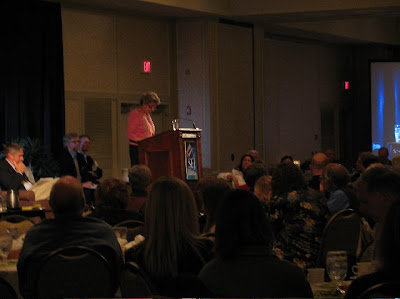 On Wednesday evening, Tia Nelson -- daughter of Earth Day founder Senator Gaylord Nelson -- regaled diners at the opening plenary with tales of political deals done over drinks -- and more drinks.
On Wednesday evening, Tia Nelson -- daughter of Earth Day founder Senator Gaylord Nelson -- regaled diners at the opening plenary with tales of political deals done over drinks -- and more drinks.
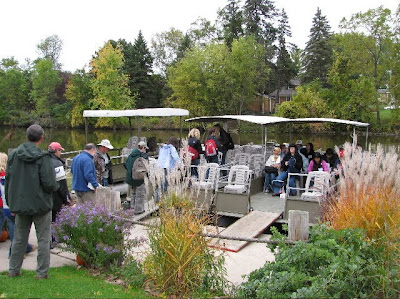 Thursday, most of us took off on tours; I joined the "Wetlands, Wildlife, and Wind" trip which included a pontoon boat ride into Horicon Marsh, an internationally important wetland in central Wisconsin.
Thursday, most of us took off on tours; I joined the "Wetlands, Wildlife, and Wind" trip which included a pontoon boat ride into Horicon Marsh, an internationally important wetland in central Wisconsin.
 Of course it started raining as soon as we embarked on the boat ride. The canvas roofing over the boats kept most of us dry.
Of course it started raining as soon as we embarked on the boat ride. The canvas roofing over the boats kept most of us dry.
 Our tour visited the 86-turbine wind farm that started operating near Horicon Marsh last year. It's hard to capture the scale of these towers, but the blade tips reach 400 feet into the air.
Our tour visited the 86-turbine wind farm that started operating near Horicon Marsh last year. It's hard to capture the scale of these towers, but the blade tips reach 400 feet into the air.
 Back at the conference center, we encountered the usual sea of handouts. My eyes go about this blurry after reading the piles of material I end up bringing home from SEJ.
Back at the conference center, we encountered the usual sea of handouts. My eyes go about this blurry after reading the piles of material I end up bringing home from SEJ.
 Friday morning, Andrew Revkin (right) of the New York Times hosted a breakfast session on climate change with Jane Lubchenco of NOAA and Jonathan Lash of the World Resources Institute.
Friday morning, Andrew Revkin (right) of the New York Times hosted a breakfast session on climate change with Jane Lubchenco of NOAA and Jonathan Lash of the World Resources Institute.
 Al Gore headlined Friday morning's plenary about climate change. That's conference co-chair Peter Annin of IJNR hidden behind the potted plants on the right.
Al Gore headlined Friday morning's plenary about climate change. That's conference co-chair Peter Annin of IJNR hidden behind the potted plants on the right.
 Paul Ehrlich got chuckles with his usual outspoken style at a well-attended panel presentation on population.
Paul Ehrlich got chuckles with his usual outspoken style at a well-attended panel presentation on population.
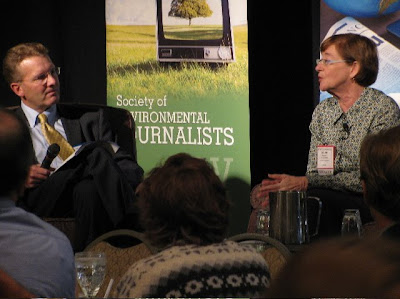 On Saturday, conference co-chair Peter Annin interviewed UN water advisor Maude Barlow as part of a fabulous panel on water issues. Annin's excellent book, The Great Lakes Water Wars, won a 2007 Great Lakes Book Award.
On Saturday, conference co-chair Peter Annin interviewed UN water advisor Maude Barlow as part of a fabulous panel on water issues. Annin's excellent book, The Great Lakes Water Wars, won a 2007 Great Lakes Book Award.
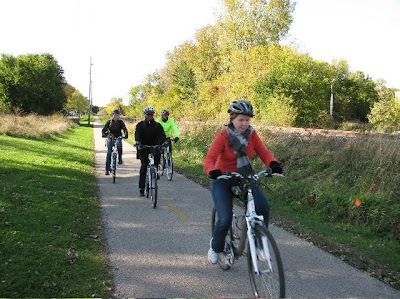 Saturday afternoon gave some of us a chance for a bicycle tour of Madison -- which aims to become the best bicycling city in the U.S.
Saturday afternoon gave some of us a chance for a bicycle tour of Madison -- which aims to become the best bicycling city in the U.S.
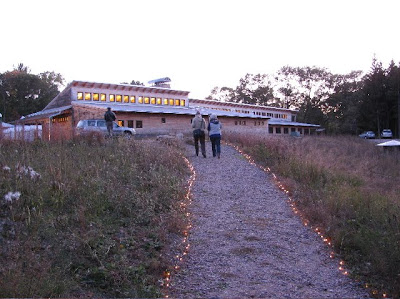 Saturday night, we bussed out to the LEED-certified Aldo Leopold Center for a great party, where I ran into some old friends and had a notable discussion with Mike and Pat Dombeck about the annual Trenary Outhouse Races (something you know about if you've ever lived in the Upper Peninsula of Michigan, as the Dombecks did formerly and as I do now).
Saturday night, we bussed out to the LEED-certified Aldo Leopold Center for a great party, where I ran into some old friends and had a notable discussion with Mike and Pat Dombeck about the annual Trenary Outhouse Races (something you know about if you've ever lived in the Upper Peninsula of Michigan, as the Dombecks did formerly and as I do now).
 Sunday morning at the UW-Madison Arboretum, Wendell Berry headlined a wonderful panel focused on Aldo Leopold's legacy.
Sunday morning at the UW-Madison Arboretum, Wendell Berry headlined a wonderful panel focused on Aldo Leopold's legacy.
 Nina Bradley (Aldo Leopold's daughter) and Wendell Berry shared a lighter moment during Q&A after the panel presentations. Curt Meine organized the panel, which also included former Forest Service chief Mike Dombeck and Aldo Leopold's son Carl.
Nina Bradley (Aldo Leopold's daughter) and Wendell Berry shared a lighter moment during Q&A after the panel presentations. Curt Meine organized the panel, which also included former Forest Service chief Mike Dombeck and Aldo Leopold's son Carl.
 Curtis Prairie displayed its autumn palette to those of us taking a final hike around the Arboretum grounds.
Curtis Prairie displayed its autumn palette to those of us taking a final hike around the Arboretum grounds.
 We departed the Arboretum after the hike to head home. I don't know how others feel, but SEJ conferences usually leave me in a state of combined exhaustion and excitement, full of so many fresh writing ideas I'm not sure where to start once I'm back at my desk. I'll probably do this again next year when the SEJ conference goes to Missoula, Montana. Looking forward to it!
We departed the Arboretum after the hike to head home. I don't know how others feel, but SEJ conferences usually leave me in a state of combined exhaustion and excitement, full of so many fresh writing ideas I'm not sure where to start once I'm back at my desk. I'll probably do this again next year when the SEJ conference goes to Missoula, Montana. Looking forward to it!
 On Wednesday evening, Tia Nelson -- daughter of Earth Day founder Senator Gaylord Nelson -- regaled diners at the opening plenary with tales of political deals done over drinks -- and more drinks.
On Wednesday evening, Tia Nelson -- daughter of Earth Day founder Senator Gaylord Nelson -- regaled diners at the opening plenary with tales of political deals done over drinks -- and more drinks. Thursday, most of us took off on tours; I joined the "Wetlands, Wildlife, and Wind" trip which included a pontoon boat ride into Horicon Marsh, an internationally important wetland in central Wisconsin.
Thursday, most of us took off on tours; I joined the "Wetlands, Wildlife, and Wind" trip which included a pontoon boat ride into Horicon Marsh, an internationally important wetland in central Wisconsin. Of course it started raining as soon as we embarked on the boat ride. The canvas roofing over the boats kept most of us dry.
Of course it started raining as soon as we embarked on the boat ride. The canvas roofing over the boats kept most of us dry. Our tour visited the 86-turbine wind farm that started operating near Horicon Marsh last year. It's hard to capture the scale of these towers, but the blade tips reach 400 feet into the air.
Our tour visited the 86-turbine wind farm that started operating near Horicon Marsh last year. It's hard to capture the scale of these towers, but the blade tips reach 400 feet into the air. Back at the conference center, we encountered the usual sea of handouts. My eyes go about this blurry after reading the piles of material I end up bringing home from SEJ.
Back at the conference center, we encountered the usual sea of handouts. My eyes go about this blurry after reading the piles of material I end up bringing home from SEJ. Friday morning, Andrew Revkin (right) of the New York Times hosted a breakfast session on climate change with Jane Lubchenco of NOAA and Jonathan Lash of the World Resources Institute.
Friday morning, Andrew Revkin (right) of the New York Times hosted a breakfast session on climate change with Jane Lubchenco of NOAA and Jonathan Lash of the World Resources Institute. Al Gore headlined Friday morning's plenary about climate change. That's conference co-chair Peter Annin of IJNR hidden behind the potted plants on the right.
Al Gore headlined Friday morning's plenary about climate change. That's conference co-chair Peter Annin of IJNR hidden behind the potted plants on the right. Paul Ehrlich got chuckles with his usual outspoken style at a well-attended panel presentation on population.
Paul Ehrlich got chuckles with his usual outspoken style at a well-attended panel presentation on population. On Saturday, conference co-chair Peter Annin interviewed UN water advisor Maude Barlow as part of a fabulous panel on water issues. Annin's excellent book, The Great Lakes Water Wars, won a 2007 Great Lakes Book Award.
On Saturday, conference co-chair Peter Annin interviewed UN water advisor Maude Barlow as part of a fabulous panel on water issues. Annin's excellent book, The Great Lakes Water Wars, won a 2007 Great Lakes Book Award. Saturday afternoon gave some of us a chance for a bicycle tour of Madison -- which aims to become the best bicycling city in the U.S.
Saturday afternoon gave some of us a chance for a bicycle tour of Madison -- which aims to become the best bicycling city in the U.S. Saturday night, we bussed out to the LEED-certified Aldo Leopold Center for a great party, where I ran into some old friends and had a notable discussion with Mike and Pat Dombeck about the annual Trenary Outhouse Races (something you know about if you've ever lived in the Upper Peninsula of Michigan, as the Dombecks did formerly and as I do now).
Saturday night, we bussed out to the LEED-certified Aldo Leopold Center for a great party, where I ran into some old friends and had a notable discussion with Mike and Pat Dombeck about the annual Trenary Outhouse Races (something you know about if you've ever lived in the Upper Peninsula of Michigan, as the Dombecks did formerly and as I do now). Sunday morning at the UW-Madison Arboretum, Wendell Berry headlined a wonderful panel focused on Aldo Leopold's legacy.
Sunday morning at the UW-Madison Arboretum, Wendell Berry headlined a wonderful panel focused on Aldo Leopold's legacy. Nina Bradley (Aldo Leopold's daughter) and Wendell Berry shared a lighter moment during Q&A after the panel presentations. Curt Meine organized the panel, which also included former Forest Service chief Mike Dombeck and Aldo Leopold's son Carl.
Nina Bradley (Aldo Leopold's daughter) and Wendell Berry shared a lighter moment during Q&A after the panel presentations. Curt Meine organized the panel, which also included former Forest Service chief Mike Dombeck and Aldo Leopold's son Carl. Curtis Prairie displayed its autumn palette to those of us taking a final hike around the Arboretum grounds.
Curtis Prairie displayed its autumn palette to those of us taking a final hike around the Arboretum grounds. We departed the Arboretum after the hike to head home. I don't know how others feel, but SEJ conferences usually leave me in a state of combined exhaustion and excitement, full of so many fresh writing ideas I'm not sure where to start once I'm back at my desk. I'll probably do this again next year when the SEJ conference goes to Missoula, Montana. Looking forward to it!
We departed the Arboretum after the hike to head home. I don't know how others feel, but SEJ conferences usually leave me in a state of combined exhaustion and excitement, full of so many fresh writing ideas I'm not sure where to start once I'm back at my desk. I'll probably do this again next year when the SEJ conference goes to Missoula, Montana. Looking forward to it!
Friday, August 14, 2009
A nice copy editor, in case you're looking ....
If you're looking for a copy editor to review your work, I just met one who comes highly recommended. A former journalist, Laurie Gibson is based in Monterey, California, and works freelance. Her clients include both publishers and writers.
I took Laurie's class "Book Publishing 1-2-3" when I was last in California, and I was impressed both with her knowledge of writing and publishing, and with her good humor. The many testimonials I've read about her say that she's a pleasure to work with, and I can see why! She can be contacted at wordworker1@earthlink.net.
I took Laurie's class "Book Publishing 1-2-3" when I was last in California, and I was impressed both with her knowledge of writing and publishing, and with her good humor. The many testimonials I've read about her say that she's a pleasure to work with, and I can see why! She can be contacted at wordworker1@earthlink.net
Thursday, May 7, 2009
Suzanne Strempek Shea and Two Pages a Day
 The Writer's Journey series at Finlandia University ended last month with a flourish: a wonderful presentation by New England writer Suzanne Strempek Shea. She is the author of five novels and three non-fiction books, in addition to a slew of articles for newspapers and magazines.
The Writer's Journey series at Finlandia University ended last month with a flourish: a wonderful presentation by New England writer Suzanne Strempek Shea. She is the author of five novels and three non-fiction books, in addition to a slew of articles for newspapers and magazines.I've read Suzanne's novel Becoming Finola, a delightful excursion from the U.S. to Ireland and through the realms of identity. I'm looking forward to reading Shelf Life, a memoir of her real-life experiences as an author working in a bookstore. And then there's Sundays in America, her most recent book and the one she discussed at Finlandia.
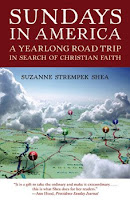
To write Sundays in America, Suzanne spent a year traveling to different Christian churches each week. She sat in on services from the very small – a congregation of Shakers in Maine, where the 20 visitors outnumbered the four actual church members – to the unabashedly huge – a stadium seating 16,000, where the televangelist's sermon, she said, consisted largely of diet tips.
Suzanne spoke of all this with humor and pizazz, the same engaging and approachable style I found when I paged through the book. Listening to her, I found myself thinking: what a great way to learn more about something that is so important to American culture, and to so many of us personally. Now Sundays in America is on my must-read list.
In keeping with the Writer's Journey theme, Suzanne also talked about her life as a writer, and stressed a point that appears over and over in the literature: If you want to be a writer, the most important thing you can do is write. Establish a discipline.
"Sit down each day, even if it's for two words or two sentences," Suzanne says. She herself writes two pages a day, at least five or six days a week, and notes, "When I'm really on a roll, it's every day." She departs from that schedule for "general life crises," and adds, "When I feel ill, I curl up and watch bad TV."
It doesn't sound like much, but with two pages a day she has produced eight books and 12 to 24 articles per year in the 20 years she's been freelancing (she worked as a reporter for almost a decade before that). Learning that writer Elinor Lipman writes two pages a day inspired Suzanne to begin this (Lipman just released her tenth book, The Family Man). It's not an uncommon practice: I heard years ago that Sue Grafton writes two pages a day, and that's how she's produced her alphabet of best-selling mysteries.
 This underlines Suzanne's point. Whether it's two words, two lines, two pages, or two hours a day, persistence pays off. In my own career, I have observed over and over that this persistence, this steady practice, is the number one most common denominator for success as a writer. So I agree wholeheartedly with Suzanne. The most important part of any writer's journey is to write, and keep at it.
This underlines Suzanne's point. Whether it's two words, two lines, two pages, or two hours a day, persistence pays off. In my own career, I have observed over and over that this persistence, this steady practice, is the number one most common denominator for success as a writer. So I agree wholeheartedly with Suzanne. The most important part of any writer's journey is to write, and keep at it.The Writer's Journey seminars are over for the year, but they were so well received that there has been talk of holding them again. My opinion: such a great series bears repeating. Kudos to Finlandia and everyone involved in putting these on, and I hope you, too, will keep at it!
Much appreciation again to Karen Johnson for providing these images of Suzanne Strempek Shea speaking and reading at Finlandia's Chapel of St. Matthew. Thanks, Karen!
Sunday, April 19, 2009
A Successful Novel
I had never heard of Tonga until one of my school friends ended up going there for the Peace Corps. Even then, I didn't learn much beyond the bits and pieces that filtered back from his remote location – like "South Pacific paradise" and "he might marry a Tongan woman and stay" – snippets that evoked exotic images of coconut palms, languid beaches, and our buddy gone native.
 He didn't end up staying, but I ended up with a sense of mystique about the place. That only deepened -- though maybe in a different way -- when I heard reports of a rare and gruesome murder within Peace Corps ranks in Tonga at around that same time.
He didn't end up staying, but I ended up with a sense of mystique about the place. That only deepened -- though maybe in a different way -- when I heard reports of a rare and gruesome murder within Peace Corps ranks in Tonga at around that same time.
I'm not sure whether my friend was in Tonga at the time of the murder, but Jan Worth was there, and close enough to those involved to be deeply affected. Her resulting autobiographical novel Night Blind gives a remarkable account of Peace Corps life in Tonga in the late 1970s. As happened in real life, in this fictional account the lead character's coming of age gets complicated when a horrible murder shocks her Tongan island community and leaves her reeling.
Night Blind is a rare find: a literary novel that's also a page turner. Crafted with scathing honesty, it is in turns funny, touching, shocking, entertaining, and deeply compelling.
Jan is a gifted storyteller, one of those writers so facile with words that she makes a novelist's work look easy. In reality, though, it's not so easy, and when Jan came last week to Finlandia University to present a Writer's Journey seminar, she delivered that message in person.
 On the way to publishing Night Blind, she said, she slogged through multiple drafts, many years, an agent or two, and 40 rejections. "I turned into an old woman, writing this novel about a young woman," she told us.
On the way to publishing Night Blind, she said, she slogged through multiple drafts, many years, an agent or two, and 40 rejections. "I turned into an old woman, writing this novel about a young woman," she told us.
Especially after reading the book and seeing how good it is, this was a potent reminder for me of how random success as a writer -- and especially success as a novelist -- can be. (I've even heard publishing professionals cite studies that demonstrate this.) Rejections notwithstanding, once Jan decided to take charge of publishing her novel by going through iUniverse, the book went on to become a finalist for Foreword Magazine's Book of the Year Award in Literary Fiction.
iUniverse is one of the newer web-based publishing options that provides editorial, printing, and on-line sales support for self-publishing. The process is more financially risky for authors but provides a lot more control. Jan reported that, by using iUniverse, she has sold more copies of her novel than many colleagues who've published through university presses.
I was sold on the book by seeing her in person. Her engaging wit had us chuckling in the chapel; given the surroundings, some of us were attempting to respectfully stifle guffaws but Jan still had us laughing out loud. Here, for instance, is part of what she read from her novel:
When [the Peace Corps' Tonga] Group 17 first heard the [Tongan] language spoken – in late August, in the California Hotel in San Francisco during staging – titters erupted when Pulu, who met us there, announced with a straight face, "Volunteers, the word for beautiful is faka'ofa'ofa." The word for respect -- a key concept in the soberly formal culture – was faka'apa'apa. Doing things the Tongan way was fakatonga. Even the word murder, which we learned first as merely a curiosity, never dreaming of its hard attack into our lives, was fakapo -- literally, of the dark. Pulu had no particular explanation. He swore it had no connection with, well, that English word, which out of Tongan courtesy he would not say. Faka was just a linguistic quirk, a coincidence. No wonder everybody got horny. I especially enjoyed hearing it come from the mouths of the pious American do-gooders – our trainer Liz, for example, or Evelyn Henry, the sanctimonious country director. If they wanted to communicate, they had to force their lips and tongues to form the "F" word. Even to say please required fakamolemole.
For me, in 1976, it felt right, fuck being a totemic word in my personal lexicon. For me as a preacher's daughter, swearing carried particular power.... So I was greatly amused when, in the fall of 1976 for hours every morning, I was repeating one word after another that sounded like fuck. The weather was faka'ofa'ofa. The discussions were fakafiefia, enjoyable, and when I began to get better at it, I tried to fakakata, or make people laugh.
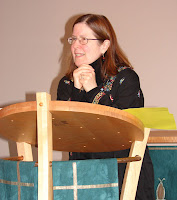 Jan's humor, depth of insight, full-bodied engagement with the world, and love of language emanate not just from her novel but also from her poems and other writings. You can sample her poetry at her website, and read the first two chapters of her novel online. You can also buy Night Blind locally at North Wind Books, or online at iUniverse. I recommend it!
Jan's humor, depth of insight, full-bodied engagement with the world, and love of language emanate not just from her novel but also from her poems and other writings. You can sample her poetry at her website, and read the first two chapters of her novel online. You can also buy Night Blind locally at North Wind Books, or online at iUniverse. I recommend it!
Thanks once more to Karen Johnson of Finlandia University for these photos of Jan Worth at the Writer's Journey seminar.
 He didn't end up staying, but I ended up with a sense of mystique about the place. That only deepened -- though maybe in a different way -- when I heard reports of a rare and gruesome murder within Peace Corps ranks in Tonga at around that same time.
He didn't end up staying, but I ended up with a sense of mystique about the place. That only deepened -- though maybe in a different way -- when I heard reports of a rare and gruesome murder within Peace Corps ranks in Tonga at around that same time.I'm not sure whether my friend was in Tonga at the time of the murder, but Jan Worth was there, and close enough to those involved to be deeply affected. Her resulting autobiographical novel Night Blind gives a remarkable account of Peace Corps life in Tonga in the late 1970s. As happened in real life, in this fictional account the lead character's coming of age gets complicated when a horrible murder shocks her Tongan island community and leaves her reeling.
Night Blind is a rare find: a literary novel that's also a page turner. Crafted with scathing honesty, it is in turns funny, touching, shocking, entertaining, and deeply compelling.
Jan is a gifted storyteller, one of those writers so facile with words that she makes a novelist's work look easy. In reality, though, it's not so easy, and when Jan came last week to Finlandia University to present a Writer's Journey seminar, she delivered that message in person.
 On the way to publishing Night Blind, she said, she slogged through multiple drafts, many years, an agent or two, and 40 rejections. "I turned into an old woman, writing this novel about a young woman," she told us.
On the way to publishing Night Blind, she said, she slogged through multiple drafts, many years, an agent or two, and 40 rejections. "I turned into an old woman, writing this novel about a young woman," she told us.Especially after reading the book and seeing how good it is, this was a potent reminder for me of how random success as a writer -- and especially success as a novelist -- can be. (I've even heard publishing professionals cite studies that demonstrate this.) Rejections notwithstanding, once Jan decided to take charge of publishing her novel by going through iUniverse, the book went on to become a finalist for Foreword Magazine's Book of the Year Award in Literary Fiction.
iUniverse is one of the newer web-based publishing options that provides editorial, printing, and on-line sales support for self-publishing. The process is more financially risky for authors but provides a lot more control. Jan reported that, by using iUniverse, she has sold more copies of her novel than many colleagues who've published through university presses.
I was sold on the book by seeing her in person. Her engaging wit had us chuckling in the chapel; given the surroundings, some of us were attempting to respectfully stifle guffaws but Jan still had us laughing out loud. Here, for instance, is part of what she read from her novel:
When [the Peace Corps' Tonga] Group 17 first heard the [Tongan] language spoken – in late August, in the California Hotel in San Francisco during staging – titters erupted when Pulu, who met us there, announced with a straight face, "Volunteers, the word for beautiful is faka'ofa'ofa." The word for respect -- a key concept in the soberly formal culture – was faka'apa'apa. Doing things the Tongan way was fakatonga. Even the word murder, which we learned first as merely a curiosity, never dreaming of its hard attack into our lives, was fakapo -- literally, of the dark. Pulu had no particular explanation. He swore it had no connection with, well, that English word, which out of Tongan courtesy he would not say. Faka was just a linguistic quirk, a coincidence. No wonder everybody got horny. I especially enjoyed hearing it come from the mouths of the pious American do-gooders – our trainer Liz, for example, or Evelyn Henry, the sanctimonious country director. If they wanted to communicate, they had to force their lips and tongues to form the "F" word. Even to say please required fakamolemole.
For me, in 1976, it felt right, fuck being a totemic word in my personal lexicon. For me as a preacher's daughter, swearing carried particular power.... So I was greatly amused when, in the fall of 1976 for hours every morning, I was repeating one word after another that sounded like fuck. The weather was faka'ofa'ofa. The discussions were fakafiefia, enjoyable, and when I began to get better at it, I tried to fakakata, or make people laugh.
 Jan's humor, depth of insight, full-bodied engagement with the world, and love of language emanate not just from her novel but also from her poems and other writings. You can sample her poetry at her website, and read the first two chapters of her novel online. You can also buy Night Blind locally at North Wind Books, or online at iUniverse. I recommend it!
Jan's humor, depth of insight, full-bodied engagement with the world, and love of language emanate not just from her novel but also from her poems and other writings. You can sample her poetry at her website, and read the first two chapters of her novel online. You can also buy Night Blind locally at North Wind Books, or online at iUniverse. I recommend it!Thanks once more to Karen Johnson of Finlandia University for these photos of Jan Worth at the Writer's Journey seminar.
Monday, April 13, 2009
Fear of the Dark
Arrayed across a card table in my living room sit three hefty stacks of paper I think of as Fat, Fatter, and Fattest. They are three incomplete drafts of a novel I'm writing. It's not the "Great American Novel" and was never meant to be, but it might be a decent story if I could ever bring myself to finish it.
I write and publish nonfiction, but also have a few poems and short stories out there in forgotten semi-literary corners. Psychologically, I find publishing fiction and poetry much harder than nonfiction: it's so much more personal, and thus so much more scary. A novel, the longest form of fiction, seems scariest of all.
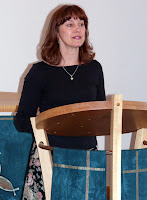 These thoughts came up as I listened to Suzanne Van Dam speak a couple weeks ago at Finlandia University's Writer's Journey seminar. Suzanne talked about writing novels and read from her very interesting and entertaining work-in-progress, Camp Atonement, about Northwoods volunteers helping the post-Katrina recovery effort in New Orleans.
These thoughts came up as I listened to Suzanne Van Dam speak a couple weeks ago at Finlandia University's Writer's Journey seminar. Suzanne talked about writing novels and read from her very interesting and entertaining work-in-progress, Camp Atonement, about Northwoods volunteers helping the post-Katrina recovery effort in New Orleans.
At one point, Suzanne offered a quote something like this: "Writing a novel is like driving cross-country at night. You can only see as far as the end of your headlight beams, but if you keep going, you'll reach your destination."
Like putting one foot in front of the other or taking things a day at a time, it's a useful metaphor (despite the fact it's about driving, ahem!). A novel is a huge project, requiring many days, many steps, the traveling of many miles; the process is so easily sidetracked by fears. Like, what if it's no good? What if I spend years of my life creating something no one else likes? On the other hand, what if they DO like it? Will they expect MORE good books? Will I disappoint them? And what if they make me appear on Oprah?
All these possibilities are out there in the dark, beyond the headlight beams. They are big, pesky distractions from why, in the first place, I write. I write because writing makes a difference for me, as mentioned in a previous post, and it can make a difference in the world. I also write because there is something about the process that draws me in, that I need like food and water. I write because in some glorious moments I can reach a place where that process becomes exhilarating, outside of time.
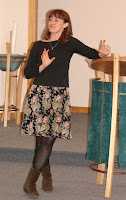
Those are moments when I can fully enjoy the part of my path that is lit, and forget all about my fear of the dark. They are moments worth cultivating, and I think the metaphor Suzanne offers can help with that. Because really, we have to focus on what's within the headlight beams, or we won't make it to the end of the journey. Thanks, Suzanne, for that reminder.
Photos of Suzanne Van Dam presenting a Writer's Journey seminar are courtesy of Karen Johnson, Finlandia University. Thanks, Karen!
COMING: a post about Jan Worth and her excellent novel Night Blind.
I write and publish nonfiction, but also have a few poems and short stories out there in forgotten semi-literary corners. Psychologically, I find publishing fiction and poetry much harder than nonfiction: it's so much more personal, and thus so much more scary. A novel, the longest form of fiction, seems scariest of all.
 These thoughts came up as I listened to Suzanne Van Dam speak a couple weeks ago at Finlandia University's Writer's Journey seminar. Suzanne talked about writing novels and read from her very interesting and entertaining work-in-progress, Camp Atonement, about Northwoods volunteers helping the post-Katrina recovery effort in New Orleans.
These thoughts came up as I listened to Suzanne Van Dam speak a couple weeks ago at Finlandia University's Writer's Journey seminar. Suzanne talked about writing novels and read from her very interesting and entertaining work-in-progress, Camp Atonement, about Northwoods volunteers helping the post-Katrina recovery effort in New Orleans.At one point, Suzanne offered a quote something like this: "Writing a novel is like driving cross-country at night. You can only see as far as the end of your headlight beams, but if you keep going, you'll reach your destination."
Like putting one foot in front of the other or taking things a day at a time, it's a useful metaphor (despite the fact it's about driving, ahem!). A novel is a huge project, requiring many days, many steps, the traveling of many miles; the process is so easily sidetracked by fears. Like, what if it's no good? What if I spend years of my life creating something no one else likes? On the other hand, what if they DO like it? Will they expect MORE good books? Will I disappoint them? And what if they make me appear on Oprah?
All these possibilities are out there in the dark, beyond the headlight beams. They are big, pesky distractions from why, in the first place, I write. I write because writing makes a difference for me, as mentioned in a previous post, and it can make a difference in the world. I also write because there is something about the process that draws me in, that I need like food and water. I write because in some glorious moments I can reach a place where that process becomes exhilarating, outside of time.

Those are moments when I can fully enjoy the part of my path that is lit, and forget all about my fear of the dark. They are moments worth cultivating, and I think the metaphor Suzanne offers can help with that. Because really, we have to focus on what's within the headlight beams, or we won't make it to the end of the journey. Thanks, Suzanne, for that reminder.
Photos of Suzanne Van Dam presenting a Writer's Journey seminar are courtesy of Karen Johnson, Finlandia University. Thanks, Karen!
COMING: a post about Jan Worth and her excellent novel Night Blind.
Monday, March 30, 2009
A Great Correction? Musings on Sandra Postel's Water Ethic
Lake Superior lines a part of the horizon I see out my north-facing window. Looking at such a vast expanse of water, it's sometimes hard to grasp that an even vaster expanse of the world is what water policy expert Sandra Postel calls "water stressed." Close to a billion human beings, and likely higher numbers from other species, do not have access to the water they need to survive and thrive.
After Postel spoke last week at Michigan Tech, I went online to quote her water ethic: "Provide all living things with enough water before some get more than enough." It's obviously not an ethic our society now lives by.
My posting got a response from former schoolmate Tim Tynan, who wrote: "Too late to follow that advice for salmon in the Pacific Northwest, I'm afraid. So, what to do now to save the species?" As a federal agency fisheries biologist, Tim fights an administrative battle to preserve what's left of a once monumental salmon population. At work, he says, he "slays dragons to rescue fish in distress." (He is quick to clarify that his statements here are his personal opinion, and not reflective of the agency he works for.)

Click here for a video about salmon restoration in Northern California from Occidental Arts & Ecology Center's Water Institute
When I asked Tim what would change if we truly lived by Postel's ethic, he answered: "A bunch of farms, tract homes and communities in the west (especially eastern Washington and California) would dry up and blow away. Water in the majority of our major salmon production areas is already over-appropriated water right-wise, with still more development and people moving into those areas. For salmon watersheds, we are trying to preserve the best, and hope for the best for the remainder."
This all makes me think of the economic "bubble," now burst, and the short-term thinking which has allowed the building of all the water-hungry farms and tract homes and communities that generate water stress by allowing human infrastructure and population to grow past carrying capacity.
Does the current economic slowdown give us any opportunity to change that? To find prosperity in different ways? Postel herself believes that we are in the midst of a "great correction" – a "balancing between the human economy and natural resources."
I'd like to believe she's right. I'd like to believe we'll all learn that human survival depends on the survival of other species, that if salmon and so many others go down, we will inevitably follow. I'd like to believe that as a culture, we will realize this in time to stop that trend, and even reverse it.
In the meantime, I'm grateful to all those like Tim who, even despite dismal odds, still do what they can on a daily basis to slow down the effects of our short-sightedness.
Read the report about Sandra Postel's Michigan Tech speech and other Copper Country news at Keweenaw Now
After Postel spoke last week at Michigan Tech, I went online to quote her water ethic: "Provide all living things with enough water before some get more than enough." It's obviously not an ethic our society now lives by.
My posting got a response from former schoolmate Tim Tynan, who wrote: "Too late to follow that advice for salmon in the Pacific Northwest, I'm afraid. So, what to do now to save the species?" As a federal agency fisheries biologist, Tim fights an administrative battle to preserve what's left of a once monumental salmon population. At work, he says, he "slays dragons to rescue fish in distress." (He is quick to clarify that his statements here are his personal opinion, and not reflective of the agency he works for.)

Click here for a video about salmon restoration in Northern California from Occidental Arts & Ecology Center's Water Institute
When I asked Tim what would change if we truly lived by Postel's ethic, he answered: "A bunch of farms, tract homes and communities in the west (especially eastern Washington and California) would dry up and blow away. Water in the majority of our major salmon production areas is already over-appropriated water right-wise, with still more development and people moving into those areas. For salmon watersheds, we are trying to preserve the best, and hope for the best for the remainder."
This all makes me think of the economic "bubble," now burst, and the short-term thinking which has allowed the building of all the water-hungry farms and tract homes and communities that generate water stress by allowing human infrastructure and population to grow past carrying capacity.
Does the current economic slowdown give us any opportunity to change that? To find prosperity in different ways? Postel herself believes that we are in the midst of a "great correction" – a "balancing between the human economy and natural resources."
I'd like to believe she's right. I'd like to believe we'll all learn that human survival depends on the survival of other species, that if salmon and so many others go down, we will inevitably follow. I'd like to believe that as a culture, we will realize this in time to stop that trend, and even reverse it.
In the meantime, I'm grateful to all those like Tim who, even despite dismal odds, still do what they can on a daily basis to slow down the effects of our short-sightedness.
Read the report about Sandra Postel's Michigan Tech speech and other Copper Country news at Keweenaw Now
Sunday, February 15, 2009
Writing Makes a Difference
Adapted from remarks given at "The Writer's Journey" seminar series, Finlandia University, January 29, 2009
This afternoon I want to share a few things about my own writer's journey. I organized what I have to say around the idea that writing makes a difference.
The way I see it, writing making a difference on two main levels. Writing can make a difference personally, and it can make a difference politically, even planet-wide.
I believe I am a writer because writing makes a difference. I discovered how it could make a personal difference first, when I was in grade school and began writing in diaries and journals.
What I noticed, as I filled diary pages with teenage angst, is that something happened inside me when I poured my experiences and emotions out onto a blank page. It was a great relief for me to do this. It vented my emotions, helped me clarify my thoughts, guided me through difficult decisions, worked out conflicts. Writing made a difference to me by helping me understand the world and better understand myself. And so it became very important to me to be able to write.
I learned later that much of the writing that had helped me with life's struggles is a type called "expressive writing." This is where you write about some sort of emotional upheaval or trauma, not only recounting what's happened to you, but also writing how you feel about it, letting go and pouring out your deepest emotions.
What I say about it here comes largely from the work of researcher James Pennebaker. It turns out this kind of writing makes an actual physiological difference for us that has been measured scientifically. Expressive writing is good for our health -- it enhances our immune systems, it can decrease blood pressure, reduce sleep disturbances, decrease chronic pain, improve lung function in asthma patients, boost working memory, and reduce stress.
The process of writing about emotional upheaval can be upsetting or saddening as you do it, and immediately afterward. But generally this sadness lifts after a short time – sometimes a matter of minutes – and longer-term effects of well-being set in.
I've experienced this, and my experiences of feeling better after writing got me hooked on the process. As that happened, I began exploring ways to do more of it. Early on, I wrote for school newspapers, and in college, started getting paid for some of my writing.

Speaking at Finlandia. Taken by reporter Layla Aslani, this photo accompanied the news article about The Writer's Journey in The Daily Mining Gazette.
I soon learned that writing for money is a very different process from expressing oneself in a journal, and it is not necessarily as healthy. It brings up a lot of self-criticism, self-doubt, and fears of rejection or judgment from others, and all that in itself can be very traumatizing. So then you have to use expressive writing to get over the trauma!
But when you write for money, and for an audience, you do get into the second way that writing makes a difference: it makes a difference in the broader world as an advocacy tool.
From very early on I had a desire to make the world a better place, and I had strong opinions about how to do that. So I really liked making a difference by using writing as an advocacy tool.
There's a type of writing I've done a lot of professionally which is now sometimes called advocacy journalism. I guess you could define this as nonfiction reporting but with more of a point of view than you'd find in a mainstream newspaper.
One example is an article I wrote for my college paper, one of the very first articles for which I was paid. It's about a food coop that was new in our college town and needed help to keep going. In that article I was both telling the story about the coop, and gently encouraging people to get involved.
Another example comes from the middle of my writer's journey, when I wrote a lot for regional and national magazines. One of my magazine articles was about green cosmetics, and again, it's both informative and encouraging of green cosmetics as a better choice.
A third example comes from a more recent stage in my writer's journey, when I wrote a book called Divorce Your Car! The subtitle, Ending the Love Affair with the Automobile, tells you what that book advocates, but I should also make clear that the book is not about wiping cars off the face of the planet – it is really about changing the relationship we have with cars.
I'm fortunate to have gotten some positive reviews for Divorce Your Car!, and my very favorite was a review that said the book is "not as biased as the title makes it sound." And this is my way of making a segue into another kind of writing I've done.
In writing non-fiction, I've also written straight journalism, where I am careful to stick to reportable facts and keep my own opinion out of the writing – an example of that would be the series on climate change in the Lake Superior basin that I wrote for Keweenaw Now in 2007. This kind of writing can also make a difference, simply by raising people's awareness.
To finish, I'd like to share one compelling experience I had, shortly after Divorce Your Car! came out. I was on the west coast in the middle of a car-free book tour, where I traveled to interviews and bookstore readings by bus and train and folding bicycle. I had just finished a reading at a bookstore in Bellingham, Washington, and an older woman came up to me and said very simply, "Thank you for writing this. Your book changed my life." I was so floored that I didn't know what to say. I think we did chat a bit more, but I don't remember what we said. What's seared on my memory is the visual image of her standing there in the bookstore when she said those words. I felt both very humbled and very honored. I am lucky to have had this kind of experience more than once.
So even though the ideal world I envision is not yet out there, I know that writing makes a difference. Whether it's deeply emotional journal writing, or advocacy writing, or straight non-fiction, or even humor, I firmly believe this, and I hope you will find, whether you read or write or both, that writing can make a difference for you.
This afternoon I want to share a few things about my own writer's journey. I organized what I have to say around the idea that writing makes a difference.
The way I see it, writing making a difference on two main levels. Writing can make a difference personally, and it can make a difference politically, even planet-wide.
I believe I am a writer because writing makes a difference. I discovered how it could make a personal difference first, when I was in grade school and began writing in diaries and journals.
What I noticed, as I filled diary pages with teenage angst, is that something happened inside me when I poured my experiences and emotions out onto a blank page. It was a great relief for me to do this. It vented my emotions, helped me clarify my thoughts, guided me through difficult decisions, worked out conflicts. Writing made a difference to me by helping me understand the world and better understand myself. And so it became very important to me to be able to write.
I learned later that much of the writing that had helped me with life's struggles is a type called "expressive writing." This is where you write about some sort of emotional upheaval or trauma, not only recounting what's happened to you, but also writing how you feel about it, letting go and pouring out your deepest emotions.
What I say about it here comes largely from the work of researcher James Pennebaker. It turns out this kind of writing makes an actual physiological difference for us that has been measured scientifically. Expressive writing is good for our health -- it enhances our immune systems, it can decrease blood pressure, reduce sleep disturbances, decrease chronic pain, improve lung function in asthma patients, boost working memory, and reduce stress.
The process of writing about emotional upheaval can be upsetting or saddening as you do it, and immediately afterward. But generally this sadness lifts after a short time – sometimes a matter of minutes – and longer-term effects of well-being set in.
I've experienced this, and my experiences of feeling better after writing got me hooked on the process. As that happened, I began exploring ways to do more of it. Early on, I wrote for school newspapers, and in college, started getting paid for some of my writing.

Speaking at Finlandia. Taken by reporter Layla Aslani, this photo accompanied the news article about The Writer's Journey in The Daily Mining Gazette.
I soon learned that writing for money is a very different process from expressing oneself in a journal, and it is not necessarily as healthy. It brings up a lot of self-criticism, self-doubt, and fears of rejection or judgment from others, and all that in itself can be very traumatizing. So then you have to use expressive writing to get over the trauma!
But when you write for money, and for an audience, you do get into the second way that writing makes a difference: it makes a difference in the broader world as an advocacy tool.
From very early on I had a desire to make the world a better place, and I had strong opinions about how to do that. So I really liked making a difference by using writing as an advocacy tool.
There's a type of writing I've done a lot of professionally which is now sometimes called advocacy journalism. I guess you could define this as nonfiction reporting but with more of a point of view than you'd find in a mainstream newspaper.
One example is an article I wrote for my college paper, one of the very first articles for which I was paid. It's about a food coop that was new in our college town and needed help to keep going. In that article I was both telling the story about the coop, and gently encouraging people to get involved.
Another example comes from the middle of my writer's journey, when I wrote a lot for regional and national magazines. One of my magazine articles was about green cosmetics, and again, it's both informative and encouraging of green cosmetics as a better choice.
A third example comes from a more recent stage in my writer's journey, when I wrote a book called Divorce Your Car! The subtitle, Ending the Love Affair with the Automobile, tells you what that book advocates, but I should also make clear that the book is not about wiping cars off the face of the planet – it is really about changing the relationship we have with cars.
I'm fortunate to have gotten some positive reviews for Divorce Your Car!, and my very favorite was a review that said the book is "not as biased as the title makes it sound." And this is my way of making a segue into another kind of writing I've done.
In writing non-fiction, I've also written straight journalism, where I am careful to stick to reportable facts and keep my own opinion out of the writing – an example of that would be the series on climate change in the Lake Superior basin that I wrote for Keweenaw Now in 2007. This kind of writing can also make a difference, simply by raising people's awareness.
To finish, I'd like to share one compelling experience I had, shortly after Divorce Your Car! came out. I was on the west coast in the middle of a car-free book tour, where I traveled to interviews and bookstore readings by bus and train and folding bicycle. I had just finished a reading at a bookstore in Bellingham, Washington, and an older woman came up to me and said very simply, "Thank you for writing this. Your book changed my life." I was so floored that I didn't know what to say. I think we did chat a bit more, but I don't remember what we said. What's seared on my memory is the visual image of her standing there in the bookstore when she said those words. I felt both very humbled and very honored. I am lucky to have had this kind of experience more than once.
So even though the ideal world I envision is not yet out there, I know that writing makes a difference. Whether it's deeply emotional journal writing, or advocacy writing, or straight non-fiction, or even humor, I firmly believe this, and I hope you will find, whether you read or write or both, that writing can make a difference for you.
Subscribe to:
Posts (Atom)
